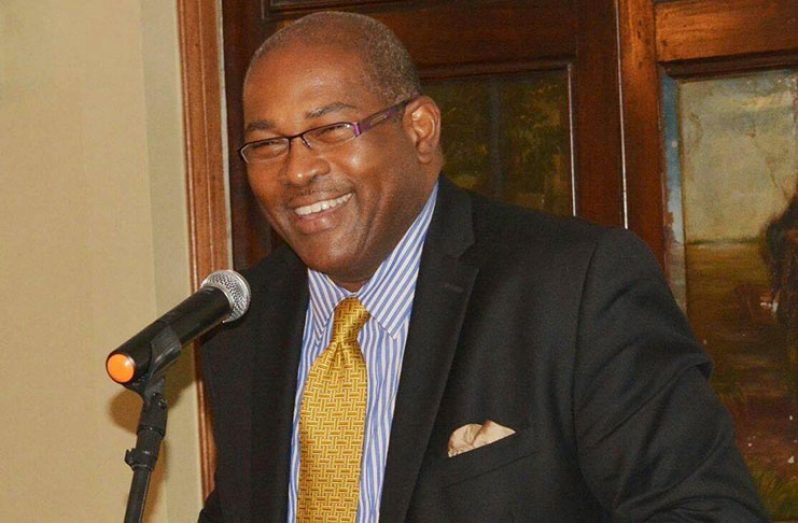– Nigel Hughes
ATTORNEY-AT-LAW Nigel Hughes says it is unfortunate that as Guyana is heading into what may be the best economic situation possible for the country, the political climate is one motivated by a greed for power.
Hughes made this, and other observations, during a recent interview with Enrico Woolford, host of the television programme ‘Context’, to be aired this evening on the National Communications Network (NCN), at 19:00hrs.
“The legislative agenda [is] just for oil—forget everything else—the legislative agenda [is] to get us to a position where we have a decent institutional framework [such as] a Petroleum Commission; the regulations, all those things that, in the best of years, would have been a tight, packed legislative agenda …all of that goes on suspension while we have this war,” Hughes reasoned.
On November 15, 2018, leader of the People’s Progressive Party (PPP) Bharrat Jagdeo, filed a no-confidence motion against the three and a half years government, claiming “unbelievable” levels of corruption.
The move spiraled into several controversies, such as the conceding vote for the no-confidence motion by a former government Member of Parliament (MP) Charrandass Persaud, now under investigation, and the court challenge which ensued of whether the MP could vote against his own party; what constitutes a majority and whether MPs can hold dual citizenship. The court matters are now under appeal.
The no-confidence motion also resulted in the Guyana Elections Commission’s (GECOM’s) most recent decision, that it cannot hold elections within the constitutional 90-day period and, besides, it does not have the funding for such an undertaking.
The Elections Commission will now continue its 2019 work plan, which includes the budgeted-for house-to-house registration which is receiving the support of government ministers. Meanwhile, the Opposition is continuing to lobby for elections to be held within the 90-day timeline, even with less than 30 days remaining of the timeline.
The Constitution, however, allows for an extension of the three- month period, through a two-thirds vote of the National Assembly.
But Jagdeo has stated that, at this time, his party will not be voting for an extension of the period; he will not ask for a meeting with the President, and threatened that if elections are not held by March 21, 2019, he will be considering legal actions against the government.
Continuing on his trail of thought regarding preparation for oil, Hughes cautioned: “We are going to roll into production next year in absolute chaos. We won’t have the legislative agenda, we won’t have the institutional framework in place; we won’t have the people who should really be filling those positions because we’re going to argue about every single appointment, not from the perspective of whether or not the person appointed is the best, but it’s going to come from a semi-political angle and the country is going to continue down this path of division…”
“…I find that in Guyana we’re so obsessed with the competition…and in the competition to dominate the ‘pie’, we are prepared to destroy the pie just to say we won. So you would be standing up over scorched earth saying ‘yes, we won’.”
The attorney-at-law also rationalised that Guyana’s political climate had for years been dominated by race, adding, there is need for constitutional reform to ensure that the country has a future where all races no longer fear exclusion.
Touching on the ruling of Chief Justice (CJ) (ag) Roxane George-Wiltshire, on the three matters currently before the court, including the majority case which he, Hughes, is credited for bringing to the fore, Hughes maintained his stance that, in Guyana’s 65-member National Assembly, where the Government holds 33 seats and the Opposition 32, 34 represents the majority.
This, he posited, is determined by an absolute majority which has a `specific’ legal meaning and which comes down to half of the total members plus one, with the consideration that there is no half of a person.
Meanwhile, the simple majority as is argued by those in Opposition, means the majority of persons who are present and voting where the majority represents one more than the other.
“You can’t pass a no-confidence vote based on the majority of people who turn up,” Hughes explained. “Within the Constitution it has different requirements for passage of different acts of parliament and therefore it’s not ‘one fits all’. In a case of a no-confidence motion, you specifically have to have a majority of the elected members,” he added.
Hughes, however, acknowledged the CJ’s ruling that, while the language used means ‘absolute majority’, in the case in question, the majority is one more than the other, where one “numerical person” exceeded the other.
“In her case, absolute and simple majority happened to coincide. That differs from the interpretation that I have, and I think it differs from the interpretation that several persons have, including the attorney general and people who have examined that,” Hughes contended.
He added that this is one of the issues that will be determined both in the Court of Appeal and, ultimately, the Caribbean Court of Justice (CCJ).
Hughes opined that, either way, as the debates pass through the courts to the final stage, Guyana will, once and for all, put an end to the dispute and avoid such obstructions to progress, should a similar situation arise in the future.
“The important thing about this is, that we need a decision on this now, so that every successive election, if we end up in the next election and there’s not clear majority, we don’t have an argument on whether it’s 33 or 34. [We need to] satisfy and clear that up at the present moment,” he suggested.



.jpg)








